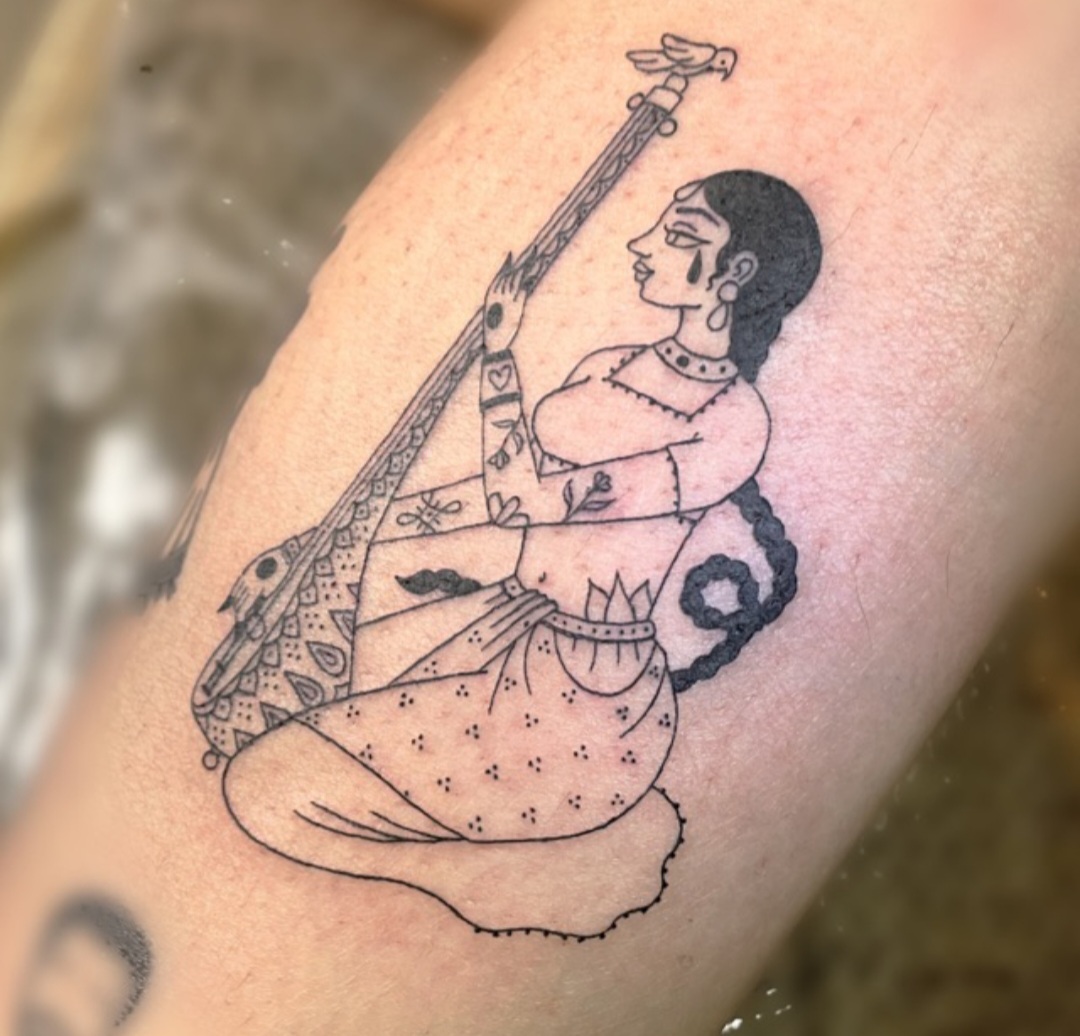LAHORE: When miniaturist Iman Sara decided during the first coronavirus lockdowns in 2020 that she wanted to learn tattooing, she scoured through a number of body art parlors in her hometown of Lahore and discovered that there was not a single practitioner who had a formal arts education and could teach her the craft.
Then an idea struck her: she could be the first one.
A graduate of the Miniature Department at the National College of Arts (NCA), for the past three years Sara has been making her mark as a fine line tattooist, using her expertise in Mughal miniatures to create a niche in the body art industry.
Fine line tattoos, which involve creating designs with very fine, delicate lines, are relatively new to the tattoo industry, compared to the thicker lines and heavy color shading of traditional machine-made tattoos. And Mughal miniature motifs are virtually unheard of in body art.
So, without any apprenticeship options in Lahore or fake skin to work with, Sara had to experiment on her own body, working with Mughal motifs as her way of grounding her art in her subcontinental roots. She started practicing on her legs, then moved onto her arms, her torso and finally her hands, pouring over videos on the Internet, and researching hygiene and cleanliness to avoid infections in fresh skin wounds.
Soon her friends, husband and siblings also wanted to get tattoos from her. As word spread, other people started approaching her too, setting her off on a professional trajectory.
“I had a friend in America [who got] me all the equipment I needed,” Sara, who has 120 tattoos on her body, told Arab News from London, where she is now based and working at Lost Fox Studios. “During quarantine I taught myself how to tattoo.”

A forearm tattoo with a Mughal mermaid motif made in London on January 18, 2023. (Photo courtesy: Iman Sara)
Sara most frequently uses a 0.30mm Round Liner instrument, which comprises a tight cluster of needles, narrower than the needles used for traditional machine tattoos, but ideal for fine line work.
“We used to paint with brushes that were made of 10-15 strands of squirrel hair [for miniatures at NCA]. They were very thin, so it was a natural transition to fine line tattooing,” the artist said. “The miniature background was a blessing, same hand pressure, clean lines, attention to detail.”

Custom Mughal miniature tattoo made in London on November 22, 2022. (Photo courtesy: Iman Sara)
Sara said she had wanted to be a tattoo artist since she was 14 years old:
“But living in Pakistan, I never thought it would be a possibility for me, especially being a girl.”
Before moving to London, Sara had a client waiting list of 200 in Lahore, while the biggest tattoo parlor in Pakistan, Inkgrave Studios in Karachi, currently averages around 50 clients a month and has a waiting list of about 20 people.
One of the most experienced tattoo artists in Lahore, Meer, who only uses his first name and learnt tattooing in Thailand and Poland, said he had “never seen anything like it,” when describing Sara’s work.
“With tattoos that small and lines that thin, it would take years of experience to keep a steady hand,” he told Arab News. “Even now I see people around me, we make mistakes, ink spills out of the stenciled area. That’s easier to cover up when you have thicker lines.”

Custom miniature of a woman holding a sitar made in Lahore on September 17, 2022. (Photo courtesy: Iman Sara)
But the margin of error was “much smaller” in Sara’s work, Meer said:
“I’ve been tattooing in three countries. Watercolors are hard, but you can still use a free hand on those, this seems harder.”
An artist, model and digital content creator from Lahore who publicly uses the name Baemisaal said she found out about Sara through a colleague and had gotten multiple tattoos done from her.
“Seeing her tattoos up close instantly got me obsessed with her line work and precision. As an artist myself, detailing and finesse is super important to me,” she said. “I went to see her a year ago. I’d been wanting the tattoos I have now since I was literally 14. I [just] couldn’t trust anyone because some of my tattoos are my own illustrations.”
But Sara’s work is “so incredibly unique,” Baemisaal said. “Everywhere I go, people ask if they can look at my tattoos.”
What was best about the miniaturist, Baemisaal said, was that she gave her clients “complete freedom” over their designs.
“Some tattoo artists insist on doing things their own way,” the model said, “which never makes sense to me since it’s our bodies, the tattoos [are] etched on our skins forever.”
















